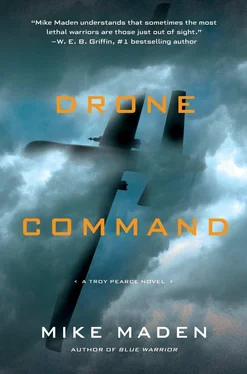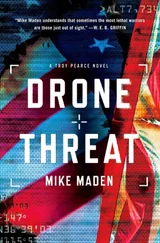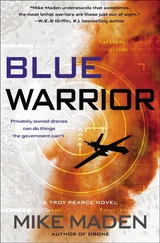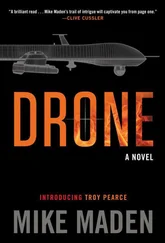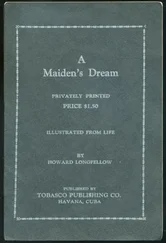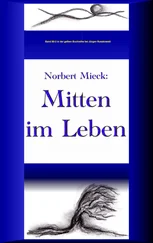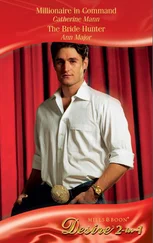“Where Troy was. If Zhao was connected in any way to Mike Early’s death—”
Ian nodded grimly. “My thoughts exactly.”
“But it was an accident, right?”
“A particularly violent one, apparently.” Ian knew that Pearce wouldn’t leave any evidence behind unless he wanted to send a message. Otherwise, an apparent accident made perfect sense.
Myers took a thoughtful sip of coffee. Troy never told Myers about any kind of revenge killings after Mike Early’s death, but she knew Pearce had killed Ambassador Britnev for his role in her son’s murder a few years earlier — a violent, foolish act on Troy’s part, but one for which she was eternally grateful. Troy’s fierce sense of loyalty was only superseded by his thirst for justice, particularly for those to whom he was loyal.
“And this Guo person?”
“Nothing’s come up yet. Maybe it’s not a person, or not a person easily found.”
“Like a special operative?”
“As good a guess as any.”
“There were Chinese special forces operators in the desert. They’re the ones who killed Mike and Mossa.” Myers had never met the fearsome Tuareg chieftain, but she felt she had after Troy’s colorful and emotional description of him.
“Then there’s the other link, if any. If Guo was an operator involved in their deaths, Troy would have taken him out, too.”
“So if Weng fingered Troy for the deaths of those two men, it still doesn’t make sense that Feng would grab him, does it? It’s a ballsy move just to get revenge.”
“Revenge, honor, hate. Pick one or all. Feng knows there’s nothing we can do about it.”
“You don’t think Feng would hurt Troy, do you?”
“Why not? What would President Lane do about it?”
“Nothing, at least for the moment.” Myers had already spoken to Lane. He recounted his conversation with President Sun. He was apologetic but firm. He wouldn’t leave Pearce behind, but Pearce needed to sit tight for now. Time was against them. They both knew Pearce would agree. But then again, time wasn’t exactly Pearce’s friend, either, Myers realized.
“What about the CIA?” Ian asked. “Pearce was one of theirs. Could they mount some kind of operation? Kidnap a Chinese agent, offer a trade?”
“Troy isn’t one of them anymore. He quit the Company, and they don’t forget that kind of thing. And when it comes to the Russian and Chinese security services, the CIA never wants to go to the mattresses.”
“Excuse me?”
“Sorry, a Godfather reference. ‘Going to the mattresses’ means going to war. The spooks never want to play roughhouse. Spying is a gentlemen’s game despite what you see in the movies. More like hide-and-seek, not MMA cage fighting. If the CIA snatches one of theirs, then they snatch one of ours, and back and forth it escalates until some real damage gets done. Best to avoid that kind of thing, or so they believe.”
“But if Pearce is a private citizen, then shouldn’t he be afforded some kind of diplomatic protection?”
“Did you forget why he was really there? If they suspect him of spying, he won’t have any protection.”
“He’s in for a rough time of it. President Lane understands that, certainly?”
“Of course he does. If I was president, I’d be forced to leave Troy in Chinese hands, too. At least, until everything else got sorted out.”
“I suppose you’re right,” Ian conceded, as he took a sip of hot tea.
“But then again, I’m no longer the president of the United States, am I?”
“Sorry, ma’am, I’m not following you.”
“There’s a phone number I need you to get for me. It’s a long shot, but it just might work.”
JAPAN’S PACIFIC COAST
WADA, CHIBA PREFECTURE, JAPAN
15 MAY 2017
Twenty wide-eyed schoolchildren oohed and aahed with grim curiosity as the whalers’ sharp pole blades sliced thirty-foot-long slabs of pink blubber. Other whalers pulled back the thick strips of skin and fat with their hands as if they were peeling a twelve-ton banana, only this banana was gray, with eyes and a wry smile.
It was the annual harvest of Baird’s beaked whales in a small Japanese whaling village on the Pacific coast. The children in their bright-blue school uniforms and yellow caps chattered excitedly. Another whale had been dragged up the bloody cement ramp from the water to the open-walled slaughterhouse.
“That’s disgusting.” The forty-three-year-old vegan and nuclear physicist scrunched up her pretty California surfer-girl face.
Yamada shrugged. “It’s a four-hundred-year-old tradition.”
“Tell that to the whale.”
“I would, but I don’t think he’d hear me.” Yamada watched two of his American graduate students wolfing down fried whale morsels and guzzling ice-cold bottles of Asahi beer.
“For a world-class whale researcher, you don’t have much empathy for the poor things,” the woman said.
“I’ve devoted my life to them, but I don’t value them above people. A small local harvest like this is no threat to the species. It’s the big floating kill factories that need to be stopped.” Yamada didn’t tell her that in his radical youth he had sabotaged Soviet whaling boats.
A whaler sliced deeper into the carcass, revealing the dark meat and viscera.
“I’m think I’m gonna be sick.” The blonde researcher stepped away, looking for a bottled water to soothe her queasy stomach.
Dr. Kenji Yamada looked more like a surf bum than a world-class marine scientist, with his dark tan and long silver pony tail. His handsome face was framed by a well-groomed platinum beard. He had been born in Japan to Japanese parents who immigrated to Hawaii when he was a young child, but he was thoroughly American and a naturalized citizen. His parents, now long since dead, were buried in a lonely Japanese cemetery on Kauai. They raised him proudly steeped in Japanese culture, tradition, and language, all three of which he closely embraced in his middle age. He was their only child, and he was childless — an unspoken disappointment for his parents, who wished for grandchildren to tend their graves and join them in the next life.
An old fisherman shuffled up with a whale fin neatly wrapped in folded paper. Yamada bowed his gratitude. The two men conversed happily in Japanese. Yamada felt the warm sun on his face, smelled the sea and the salt air. The life of the happy little village coursed in his blood. For a moment it felt like home.
* * *
Yamada listened to the soft snoring of his vegan physicist sound asleep next to him and the water chucking against the cabin bulkhead.
Yamada’s research boat was owned by Pearce Systems, but he leased the vessel for a dollar a year from Troy under a special arrangement. Yamada and his lab was Pearce Systems’ primary UUV development team, building and testing new underwater drones for use in oceanographic research, especially whale migration. Drones that Pearce Systems later sold or deployed in both civilian and military applications.
Yamada hadn’t spoken to Pearce in months. Their friendship was strong enough to weather any storm, but watching Pearce kill Jasmine Bath with one of his own turtle-shaped UUVs had wounded Yamada deeply. Yamada accepted the use of his vehicles for security purposes, though he was a pacifist. But murder for revenge was something else. He knew Pearce was a violent man, but he had never seen it up close. Bath deserved her fate, no doubt, but Yamada still couldn’t condone it. He feared it was bad karma for his old friend.
Earlier that day, the vegan researcher had threatened to blow chunks all over him if he didn’t break down the whale fin sample for her to do an assay, so he did. There was no question now. The whale meat was laced with cesium-137 and the fin bones contained strontium-90, notorious for mimicking calcium. These were just two of several known radioactive isotopes dumped into the air, ground, and waters around the Fukushima nuclear facility that were turning up in fish, plant, and even human subjects all over the Pacific, even as far as the west coast of the United States. Cesium had been found as far as two thousand kilometers away and more than five thousand meters deep just thirty days after the accident. How much more, how far, and how pervasive the subsequent nuclear contamination had been hotly debated. His contracted research mission was to try to answer those questions more definitively.
Читать дальше
